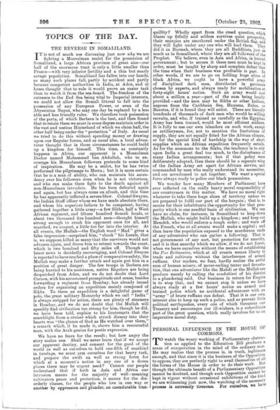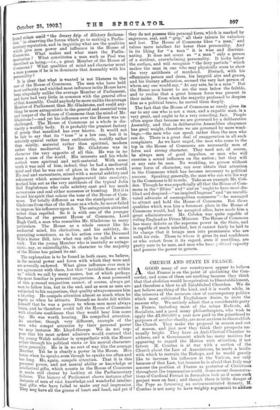PERSONAL INFLUENCE IN THE HOUSE OF COMMONS.
TO watch the weary working of Parliamentary obstruc- tion as applied to the Education Bill produces a sense of exasperation in the mind of the orchnaryman. He may realise that the process is, in truth, legitimate enough, and that since it is the business of the Opposition to oppose, they are perfectly right to avail themselves of all the forms of the House in order to do their work. .Eut though the ultimate benefit of a Parliamentary Opposition cannot be doubted, and though such Opposition cannot be kept in vigour without occasional exhibitions of the kind we are witnessing just now, the watching of the necessary process is extremely tiresome. For ourselves, we have found solace amid " the dreary drip of dilatory declama- tion " in observing the forces which go to makine. a Parlia- mentary reputation, and in inquiring what are the qualities which give men power and influence in the House of What makes and what mars the Parlia- Commons. mentarian ? What constitutes a man such as Peel was described as being,—i.e., a great Member of the House of Commons ? What qualities of mind and character must a man possess if he is to dominate that Assembly with his personality ? It is clear that what is wanted is not likeness to the rest of the House of Commons. The men who have held most authority and wielded most influence in the House have been singularly unlike the average Member of Parliament, and have had very little in common with the general ethos of that Assembly. Could anybody be more unlike the average Member of Parliament than Mr. Gladstone, and could any- thing be more antagonistic to the general and essential tone and temper of the House of Commons than the mind of Mr. Gladstone ?--and yet his influence over the House was un- challenged. The House of Commons as a whole is dis- tinctly a worldly body. It is probably the greatest factory of gossip that mankind has ever known. It would not be fair to say that its " tone " is a low one, but it is certainly cynical rather than enthusiastic,. worldly rather than saintly, material rather than spiritual, modern rather than mediaeval. Yet Mr. Gladstone was in character the very opposite of all this. He was in no sense a man of the world. His interests and his whole outlook were spiritual and anti-material. With some truth it was said of him, indeed, that he had a mediaeval mind and that he was out of place in the modern world. His zeal and earnestness, mixed with a mental subtlety and refinement which sometimes degenerated into casuistry, marked him out as the very antithesis of the typical John Bull Englishman who calls subtlety cant and too much earnestness and zeal either nonsense or humbug. But it is he and his spirit that colour the tone of the House of Com- mons. Yet totally different as was the standpoint of Mr. Gladstone from that of the House as a whole, he never failed to impress his influence upon it. The antagonism attracted rather than repelled. So it is with one of the younger Members of the present House of Commons, Lord Hugh Cecil, a man who resembles Mr. Gladstone in many particulars. The House as a whole cannot like his mediaeval mind, his clericalism, and his subtlety, de- generating sometimes, as in his action over the Deceased Wife's Sister Bill, into what can only be called a mean trick. Yet the young Member who is mentally so antago- nistic, nay, so unintelligible, in character to the majority of the House has gained its ear.
The explanation is to be found in both cases, we believe, in the mental power and force with which they were and are severally endowed. What gives influence over men is not agreement with them, but that " invisible flame within us" which we call by many names, but of which perhaps the most familiar is personal magnetism. A man possessed of this personal magnetism cannot, of course, always get men to follow him, but in the end, and as soon as men are subjected to his magnetism, that quality always ensures him a hearing. He compels attention almost as much when he repels as when he attracts. Disraeli no doubt felt within himself that he was a person to whom men must always listen, and he therefore could tell the House of Commons with absolute confidence that they would hear him some day. He was worth hearing. He compelled attention. As another, though very different, example of the men who compel attention by their personal power we may instance Mr. Lloyd-George. We do not sup- pose that his most ardent admirers would contend that the pure, Welsh solicitor is sympathetic with the House either through his political views or his mental character- istics generally. He is in no sort of way like the average Member. Yet be is clearly a power in the House. Men listen when he speaks, even though he speaks too often and too long. He, again, compels attention. That it is this personal power, and not mental ability or knowledge or intellectual gifts, which counts in the House of Commons is made still clearer by looking at the Parliamentary failures. The history of Parliament shows instance after ,"stance of men of vast knowledge and wonderful intellec- tual gifts who have failed to make any real impression. They may have all the graces of heart and head, and yet if they do not possess this personal force, which is marked by eagerness, zeal, and " grip," all their talents lie valueless and lost. The House of Commons likes " a man," and values mere intellect far lower than personality. And in its liking for " a man " it is wise and discrimi- nating. It does not count as " a man " only a person of a strident, overwhelming personality. It looks below the surface, and will recognise " the fiery particle " which makes the man in one who may physically seem to show the very antithesis of manhood. Disraeli, with his effeminate person and dress, his languid airs and graces, and his literary affectation, seemed the very last person of whom any one would say, " At any rate, he is a man." But the House soon learnt to see the man below the fribble, and to realise that a great human force was present in their midst. Even when the majority professed to despise him as a political bravo, he moved them deeply.
The fact that the House of Commons so rarely gives its ear to any one who is not a man, and a capable man, is a very great, and ought to be a very consoling, fact. People often argue that because we are governed by a deliberative Assembly, and that in deliberative Assemblies eloquence has great weight, therefore we are governed by mere wind- bags,—the men who can speak rather than the men who can do. There is a great deal of exaggeration in all such complaints. As we have urged, the men who come to the top in the House of Commons are necessarily men of force and strong character. They need not, of course, be always men of good impulses, or men who will exercise a sound influence on the nation ; but they will at any rate be men. No weakling, no person without some force of character, can ever obtain that attention in the Commons which has become necessary to political success. Speaking generally, the man who can win his way in the Commons is fit to rule. Take as an example Mr. Cob- den. Though he was superficially all that the House of Com- mons in the "fifties " and " sixties " ought to have most dis- liked and despised—" an inspired bagman" and "an unculti- vated advocate of cosmopolitan commerce "—he managed to attract and hold the House of Commons. But those qualities which won him a foremost place in the House of Commons would, had he accepted office, have made him a great administrator. Mr. Cobden was quite capable of ruling England as Prime Minister. The House of Commons has many defects as the supreme power in the State, and is capable of much mischief, but it cannot fairly be laid to its charge that it brings men into prominence who are unfit for rule. Those to whom it gives its real confidence or who extort from it its regard, even if unwilling, are pretty sure to be men, and men who have political capacity and possess the power to govern.











































 Previous page
Previous page